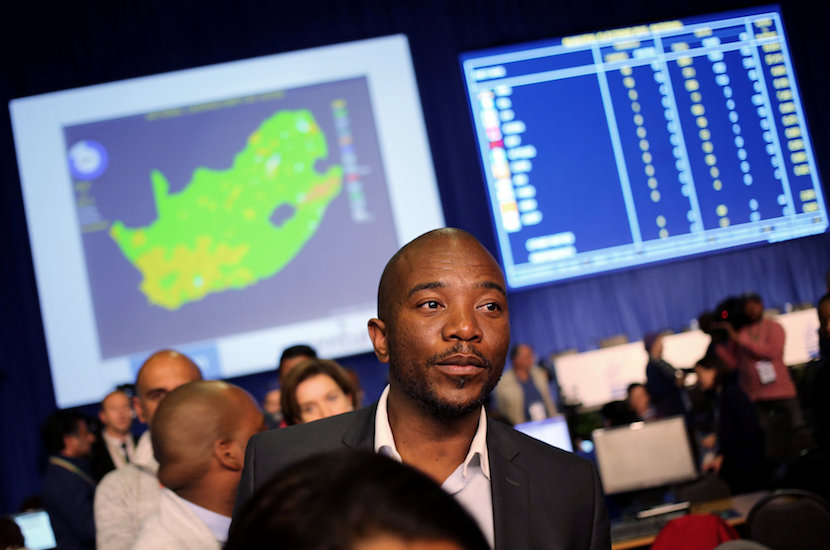South Africa’s dramatic election results feature prominently in the global media this morning. The coverage, including prominence in the influential Financial Times, tell the same message – it is a victory for democracy as an engaged electorate sent a vote of no confidence in the misrule of the ANC’s flawed President Jacob Zuma. The front page article in the FT quotes Wits vice chancellor Adam Habib who describes the result as a huge blow to the ANC, adding “this is definitely an anti-Zuma vote.” The Times of London follows the same line stating the ANC is “in retreat…after urban voters flocked to the opposition.” Although a decline in the ANC’s slice of the vote was expected, the extent has taken most by surprise. Including global currency traders who regard competitive politics as a major plus and gave the Rand a 35c boost (from R14.05 to R13.70) against the US Dollar. The election even made it into the main editorial page of the FT this morning, rather auspicious when the Bank of England dropped interest rates to a record low. This time South Africa has made global headlines for the right reasons. Hope springs. – Alec Hogg
Editorial by the Financial Times of London:
South Africans voted this week in a watershed election. The African National Congress is heading for its worst result since it came to power in 1994. With about three-quarters of the votes counted in the local elections, the ANC looks likely to lose Port Elizabeth, a historical stronghold, to the opposition Democratic Alliance. Even Pretoria, the capital, and Johannesburg, the country’s urban powerhouse, hang in the balance. Nationally, it seems certain that the ruling party will drop below 60 per cent for the first time in its electoral history.

South Africa has reason to celebrate this vote. It is time for the ANC to loosen its monopoly on power. The fact that there is room in the political arena for competing ideas over dealing with the country’s numerous problems can only be positive for the future.
South Africans remain politically engaged. However disappointed voters may be in their political leaders, they have not given up on the idea of politics as an agent of change. Most black South Africans still see their right to vote, denied for decades under apartheid, as precious and significant.
Similarly, South Africa’s institutions are, more or less, holding steady. Though there has been some concern about the ANC beginning to erode the independence of organisations as diverse as the prosecution service and the state broadcaster, South Africa’s institutional capacity to hold a free, fair and largely peaceful election is very much in tact.

For the ANC itself, the message of the election is that many voters are dismayed at the direction the party has taken under Jacob Zuma. He is perceived to have overseen an administration more interested in enriching itself than in serving the people. The economy has stalled. So has meaningful policy. The treasury is trying desperately to save the country from a downgrade to junk status by rating agencies. But it is receiving no help – quite the reverse – from the presidency. South Africa’s problems are grave. Ferociously high unemployment is perhaps the most serious. Half of young black South Africans have no job. Many have no hope of ever finding gainful employment.
If the ANC is to recover, it needs to sort itself out quickly. It must do more to stem the perception that corruption is rife, or its legitimacy will further erode. Mr Zuma must also show he is serious about trying to get the economy moving again. Education, vocational training and youth employment schemes would be places to start. Putting more emphasis on free-trade zones to encourage inward investment could be another. The party should also dust off the National Development Plan, a serious proposal to raise economic potential and to bring social justice, services and – above all – opportunity to millions of South Africans. It has never been seriously tried.
The opposition also has a role to play. Julius Malema’s Economic Freedom Fighters is serving a useful, if sometimes overly aggressive, role in keeping pressure on the ANC. The larger Democratic Alliance has an even more critical job. The DA traces its roots back to white parties. It must now do even more to connect with black South Africans and purge its ranks of any semblance of racism. Its new black leader Mmusi Maimane has made a decent start, but he needs to go further.
The DA must also prove it is as good an administrator as it claims. If it ends up in charge of Port Elizabeth it should run an impeccably clean administration that can deliver the services it promises. That would give the electorate a meaningful choice in the 2019 general election, as well as forcing the ANC to raise its game.
(c) 2016 The Financial Times Ltd.

